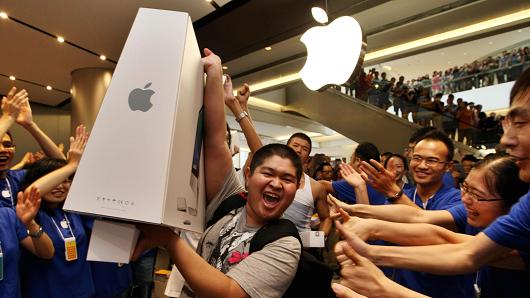Franchising, retail, business

29/01/2015
The consensus is that business in China is really really difficult. The Chinese government has put serious roadblocks in place. especially for technology companies that it deems threatening. Competition from local firms—all of which also want their share of a growing domestic middle class—is cutthroat.
But this week, Apple shocked markets and proved that with time and effort, it is possible to crack the Chinese market, despite the odds.
"All the stars aligned for Apple," said Craig Elimeliah, director of creative technology at marketing agency Rapp.
But getting those stars to align took a lot of work. Here are some of the ways Apple made it happen, and takeaways for other U.S. companies looking to the East.
China contributed to mind-boggling global sales that Apple reported in its fiscal 2015 first quarter ended Dec. 27, 2014. Source: CNBC.
Make a premium product
As China's middle class balloons, so will the number of consumers who are ready to buy luxury goods and status symbols.
"Apple has a premium product in a country that is doing well economically," Elimeliah said. "It is the premium Western product that people are going to pay for."
Case in point: When the company tried to market the lower-priced 5C, it was a bust. If the masses want premium, Elimeliah said, then give it to them.
"People love Apple here, so much that they are willing to pay double on the black market," said Shaun Rein, managing director of Shanghai-based China Market Research Group. "There are month-long waiting times here for some of these products."
Understand the Chinese consumer
Apple did a lot of good for itself when it finally signed on with China Mobile and tapped into its network of an estimated 760 million subscribers. It was a chance to bring the brand to the Chinese mainstream. The company worked long and hard to meet the carriers' technologies, but it paid off.
And Apple did something else that was uniquely appealing to the Chinese consumer—it introduced the iPhone 6 Plus in a country where bigger is better.
"Most people don't have TVs in their homes here, and the young Chinese use their mobile phones for everything—to watch movies, talk to friends and play video games," said Rein. "So having that big screen was critically important."
It took Apple years and a lot of strategizing to finally integrate a new product while maintaining the essence of the brand. But maintaining the brand's image had to be a priority, Rein said.
The Chinese also love big, beautiful flagship stores, where they can touch the products and try them out. That's something Apple needs to catch up on, Rein said. Apple CEO Tim Cook has announced a goal of 40 stores in China by the middle of 2016, about twice the current number.
Learn from others’ mistakes
While Apple was doubling its sales in China last year, Samsung has been losing market share at an alarming rate. The reason is Samsung did the very opposite from what Apple did—it offered too many models at a rapid pace, said Jeongwen Chiang, marketing professor at China's CEIBS business school.
"It diluted its prestige image, and some also say the quality and customer service are deteriorating as a result. At any rate, Samsung is in trouble now in China," he wrote to CNBC in an email.
Samsung declined comment.
It's easier to persuade consumers to pay a premium for a much smaller selection of products than bombarding them with too many options too often, Jeongwen said.
"It's the Jobs mentality that we know what is better for you," said Elimeliah. "Apple does it best with minimal options, while Samsung is so disparate" in its product choices.
Stay globally mainstream
Not only is the Apple brand a status symbol, but it's also a way for Chinese consumers to connect with the broader, global economy—something they want.
"They have a global product that looks the same everywhere, and they brought it to China without any compromise," said Frank Gillett, analyst at Forrester Research.
In some ways, the Chinese government's push toward building a more consumer-driven economy will help American and other Western companies gain traction with Chinese consumers.
"Apple is building brand equity in China, and in a way that's aligning with Chinese consumers," said Elimeliah. "They are able to differentiate themselves from the competition."
The iPhone 6 Plus is testament to a product that was able to remain true to Apple's vision, while also catering to a new type of consumer eager to join the global consumer marketplace.